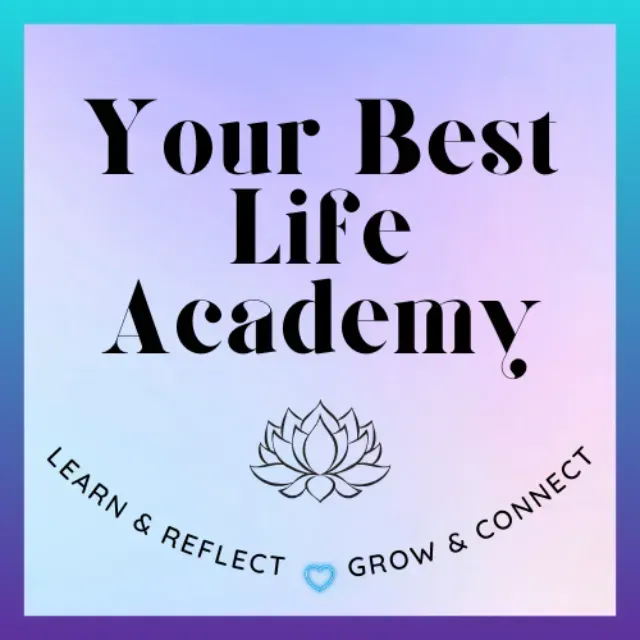The One Skill That Deepens Every Relationship You Have
Help Loved Ones Feel Heard & Validated
Published: 13 August 2025
Want to build stronger, more meaningful relationships? The secret lies in one powerful skill: active listening. When you truly listen, you create a deeper connection, build trust, and make others feel valued.
In this post, we'll explore how mastering this simple skill can transform your relationships — whether with family, friends, or colleagues. Are you ready to strengthen your bonds with active listening?
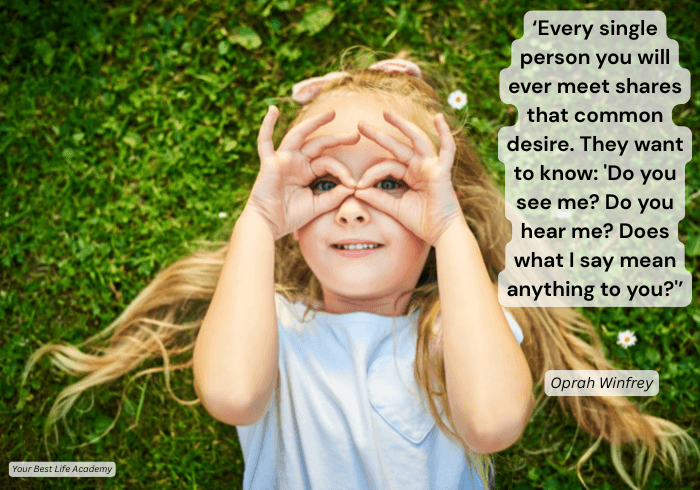
Do you ever walk away from a conversation and think, ‘Did I even hear what they just said?’ (or perhaps ‘They didn’t even hear me!’) And sometimes you may have even been called out on it – and then felt guilty. (Or perhaps you called someone else out – or just walked away feeling frustrated and unheard.)
In our fast-paced, distracted world, it’s easy to fall into the trap of half-listening — nodding while our minds are somewhere else. However, people often pick up on this, and it creates distance, misunderstandings, and even conflict in our relationships. (I know I am almost always aware of when people are actually listening to me versus when they appear distracted, and just nod or say ‘uhu’ sometimes.)
This is where active listening comes in. And when people feel heard, seen, and validated, it's a game-changer for your relationships, and connections.
What is Active Listening?
Active listening means giving someone your full attention — not just hearing their words, but really taking them in. It’s about listening to understand, not just to reply. (Which, if we’re honest, we’ve all done at some point in our lives. I remember when I was walking to high school with a friend once, and she was talking about teaching kids. I wasn’t in the right frame of mind for whatever reason, and just made the right kinds of noises, but she picked up on it, and called me on it. She was in a heartfelt sharing space, but I just wasn’t, unfortunately, and it did create a little distance in our relationship. When I was in a heartfelt sharing headspace, I asked her about it again, however this time she wasn’t in the same space, and again brought up that I didn’t listen to her the first time! So sometimes when you do feel like sharing, it might be too late. 🤷)
Active listening is a skill. And like any skill, it can be learned, improved, and strengthened — especially with support (more on that soon).
What does active listening look like? When you actively listen, you:
Make eye contact, so they can see they have your attention
Put away distractions, so they feel like your focus is on them
Pause before responding, while you consider what was said, and you want to respond
Reflect back what you heard, so they know you understood (or can be corrected)
Show genuine interest and curiosity about the topic
And yes, it’s a simple practice — but it can have a huge impact on your relationships. And your connections with other people. (People can feel heard, seen, and validated – which as Oprah mentioned, is something that everyone wants, at the end of the day – to feel that they matter.)
Listening can have an impact on both the listener, and the person talking – it can be more than just a conversation. The listening can also help us go deeper – into ourselves, and into our understanding of the other person, and their perspective, and thoughts, and values, and beliefs. "Listening is a magnetic and strange thing, a creative force. The friends who listen to us are the ones we move toward. When we are listened to, it creates us, makes us unfold and expand." - Karl A. Menniger
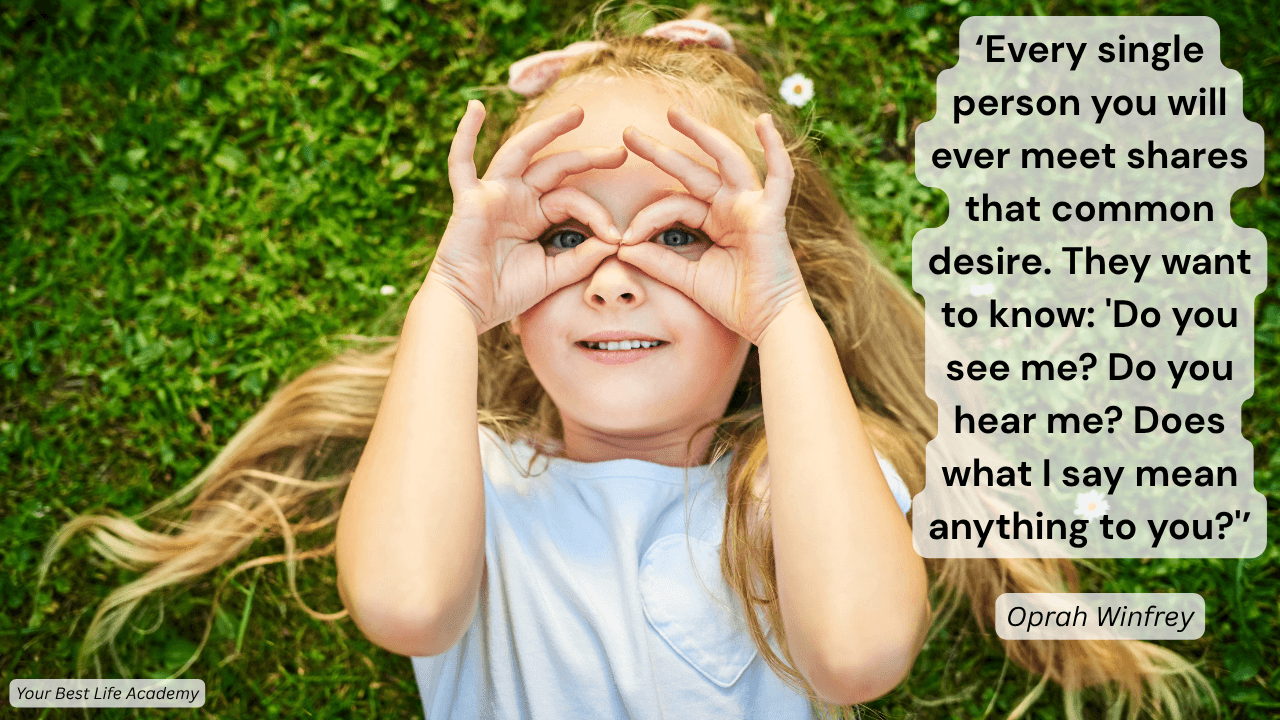
The Real-Life Struggle: Why Active Listening Is Needed More Than Ever
Most of us weren’t taught how to really listen. It’s kind of assumed that you’ll just pick it up. However, in our ‘real’ modern life, with our mobile/cell phones, laptops, ipads, etc, listening takes a distant second place – behind our screens, and behind multi-tasking.
Unfortunately, in our current daily life, it’s so easy to not really listen properly – and to put your focus on other things. There are a number of common distractions which we don’t really think about anymore – some of which are listed below.
Getting distracted by your phone, or your smart watch
Thinking about what you’ll say next (and how to ‘position’ it)
Interrupting without meaning to (after all, we’re all in a rush)
Trying to fix someone’s problem instead of just being there for them
These habits can leave others feeling unheard, unimportant, or misunderstood. That can lead to conflict, disconnection, and frustration — especially in close relationships. And let’s face it — if we’re not feeling heard, or seen, or validated — it will impact your relationships — and they may even give up, and start looking elsewhere so they feel valued.
If it sound familiar, don’t worry, there are a lot of people in this situation. However, if you’re one of them, and your connection to others is waning, there is something that you can do about it. Just because you may have gotten into a habit of not fully listening, it doesn’t mean you can’t change it. (After all, you are in control of you – and if you decide to change, you can.)
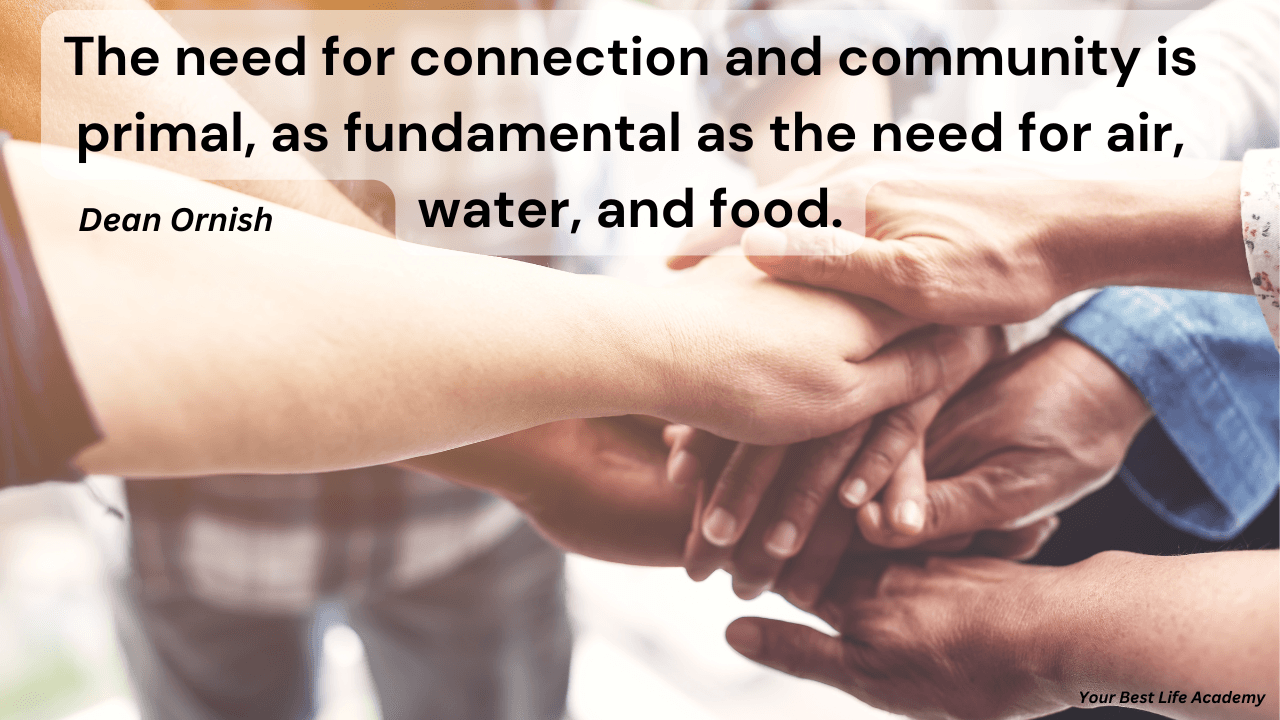
The Life-Changing Benefits of Active Listening
When you start practicing active listening, everything begins to shift.
Your relationships grow — People feel safe, seen, and valued around you. They want to spend time with you.
You deepen your connection — You hear what’s underneath the words — the emotions, the fears, the dreams — and you have deeper discussions, with real connection and emotions.
It’s easy to get into the habit of surface connections only — however over time, relationships can suffer as a result. Both Tarek and Christina El Moussa (now Anstead) from the HGTV Flip or Flop have mentioned that lack of proper, deep communication played a major part in their divorce. Now Christina is different: ‘I'm like that with everyone now. If something is on my mind, you're gonna know.’
You learn more — You notice things you never picked up on before. You understand people more clearly, and what they want and need.
You become more present — Active listening brings you into the moment. It’s almost like mindfulness — with heart.
You respond with care — Instead of reacting, you start responding. That pause and consideration of next weeks, after listening, changes everything — it shows a caring that isn’t as strong when you already have your response ready, just waiting for a chance to say it.
An example of this could be along the lines of the following.
Let’s say your partner comes home from a tough day and says, ‘I can’t deal with work anymore. I feel like I’m drowning.’
An old habit could have you interrupting, saying ‘You should just quit! It’s not worth it.’ However, active listening would sound something more like ‘That sounds really heavy. Want to tell me more about what’s going on?’
(Can you relate to something similar to the above situation? I know I can! If somebody is upset, and just wants to be heard, you could try active listening and holding space, to help them feel seen, heard, and comforted. Our blog on holding space can help if you’d like to learn a little more on this.)
The second response (above) makes space, and helps them feel supported. And it strengthens the bond between you.
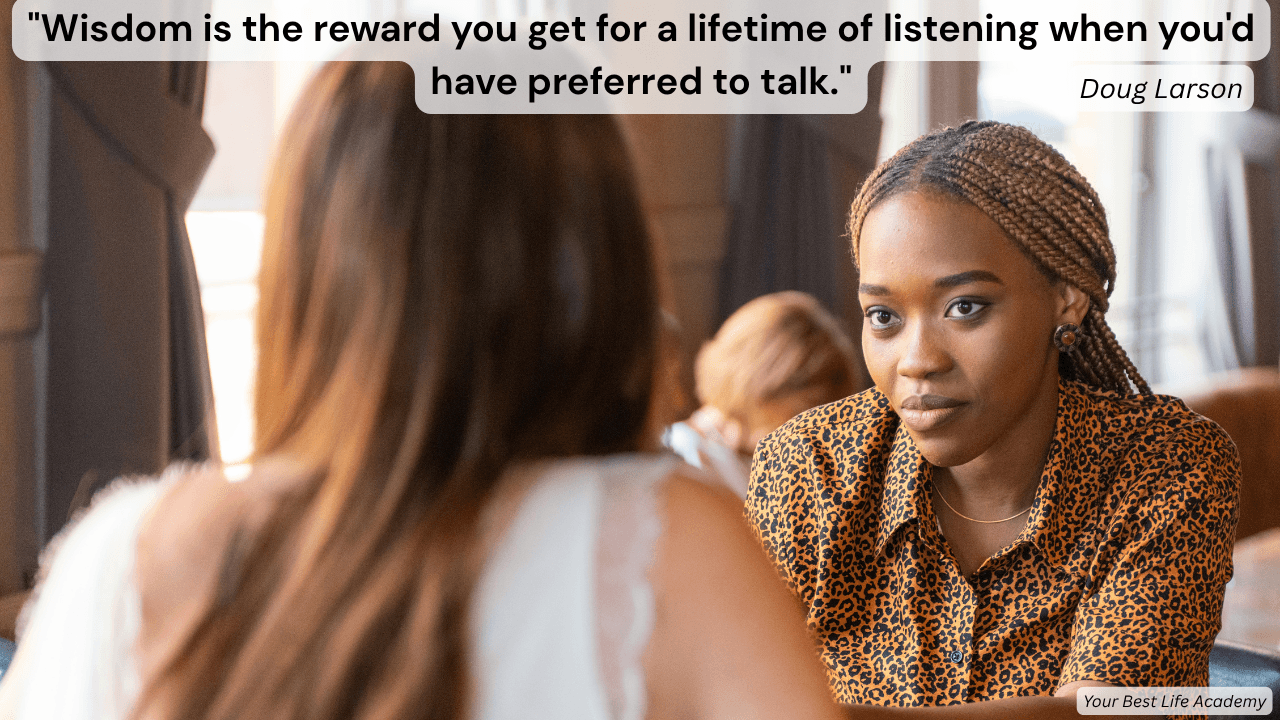
Ready to Start Active Listening and Strengthening Relationships in a New Way?
Active listening is one of the most powerful (and loving) things you can do. It can help heal misunderstandings, strengthen trust, and create space for true connection.
We’ve created a free 7-Day Active Listening Challenge to help you improve your skills — in just a few minutes a day.
This 7-Day Challenge will help you practice:
Being fully present
Listening without judgment
Communicating with more care and kindness
Build deeper trust with those you love
Whether it’s with your partner, kids, friends, or co-workers — these simple daily tips can make a real difference.
You don’t need to be perfect — just willing to show up, slow down, and listen with heart.
And if you’d like to go deeper, and really improve your relationships, our Friendship Journal (with 50 thought-provoking journal prompts) can help. It also has 30 message templates to help you reach our and/or reconnect, if you’re not sure how to do this. It’s a way to go deep within, and really consider what you want out of your relationships. (And really, it applies to all relationships, not just friendships.) And relationships are what make our life fun and worthwhile, really – community, connection, and friendships.
Your relationships don’t need to feel strained. They can feel calm, open, and deeply connected.
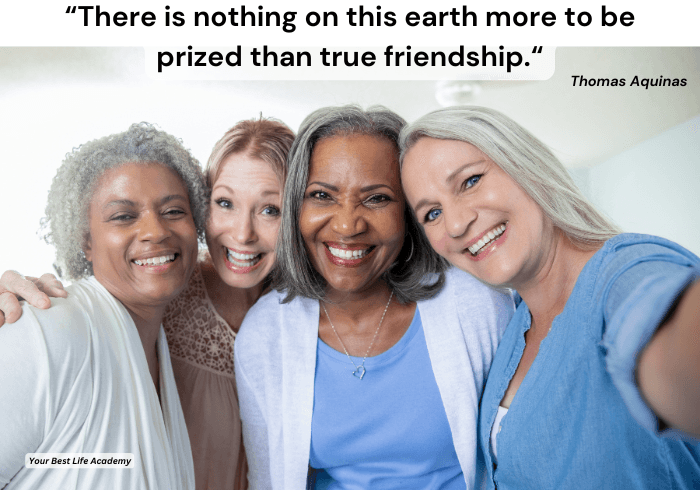
Final Thoughts
You deserve to feel connected. You deserve to feel heard. And the people around you do too.
Start with one small shift — choose to listen more deeply today.
You might be surprised at how much changes — not just in your relationships, but in how you feel inside too.
🙋 Frequently Asked Questions
1. What’s the difference between hearing and active listening?
Hearing is passive — your ears pick up sounds. Active listening is intentional. You give someone your full attention, listen to understand their message and emotions, and respond with thought and care.
2. Why is active listening so important in relationships?
It builds trust, prevents misunderstandings, and makes people feel valued. When someone feels heard, they’re more open, relaxed, and connected — which strengthens the relationship.
3. I get distracted easily. Can I still become a good active listener?
Yes, you can. Active listening is a skill you can build with practice. Our Free 7-Day Active Listening Challenge helps you gently improve focus and attention, one day at a time — even if you're busy or overwhelmed.
4. What if I don’t agree with what someone is saying?
Active listening doesn’t mean you have to agree. It means you’re willing to understand. You can listen with respect, even if your views are different. This opens space for healthy, respectful dialogue.
5. Can active listening help at work too?
Yes, it can. Teams that practice active listening communicate better, solve problems faster, and have fewer conflicts. It’s a powerful leadership and collaboration tool — not just a relationship skill.
6. Does active listening mean I can't give advice?
You can give advice — but only after you’ve really listened. Often, people don’t want solutions right away. They want to feel heard first. Once they feel understood, they’re more open to suggestions.
7. How long does it take to get better at active listening?
You’ll notice small shifts right away — even after just one day. Like any new habit, it takes time to fully integrate, but daily practice (like our free 7-Day Active Listening Challenge) makes it easy and rewarding.
8. Is active listening emotionally draining?
It shouldn’t be. In fact, it can feel energizing because you’re truly connecting. If you're getting overwhelmed, it might help to set boundaries around when, and how long, you’re available to listen deeply. (Our blog How to Set Boundaries with Anyone Anywhere: A Kind and Gentle Approach can help with setting boundaries in a kind and gentle manner.)
9. What are some signs that someone isn’t listening to me?
They interrupt, look at their phone, give short responses, or change the subject. If that happens, try gently saying, ‘Can I finish what I was saying first?’ — and model active listening in return.
10. What’s included in the Free 7-Day Active Listening Challenge?
It’s short, friendly, and doable — even if you’ve got a full schedule. You’ll get:
One simple focus each day
Quick exercises and tips
Reflection prompts
Real-world practice ideas
📚 Additional Resources
Want more practical ideas and thought-provoking content on a regular basis? Don’t miss out on all the hints & tips that you can implement over time! Sign up for weekly input to help you uplift your life – one week at a time!
We have also created stand-alone pages in the 7 life segments with all blogs, freebies, and paid products grouped together, so you can easily find and review items of interest to you. Click on the links below to find the areas of most interest to you!
Life Purpose & Best Life - Health & Wellness - Relationships - Abundance - Personal Growth - Peace of Mind - Spirituality & Energy.
📖 References/Further Reading
📝 Disclaimer
This blog is for informational and personal development purposes only. It is not a substitute for professional advice, diagnosis, or therapy. If you are experiencing serious relationship issues or emotional distress, please seek support from a qualified mental health professional. Always listen to your own inner guidance and choose what feels right for you.
Your Best Life Newsletter
Your Weekly Dose of Inspiration to Live Your Best Life!
✔️ Get practical tips to feel happier, healthier, and more fulfilled.
✔️ Discover easy ways to bring more joy and purpose into your life.
✔️ Be the first to know about new blogs, free resources, and special offers.
💌 Join our supportive community today — it's free!
